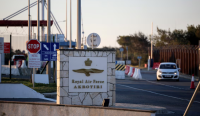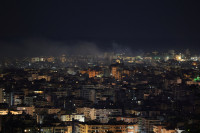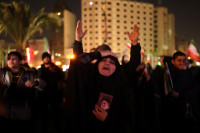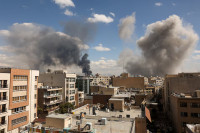World
Gazans reject Trump’s displacement plan despite death and destruction
Trump, hosting Israeli Prime Minister Benjamin Netanyahu at the White House on Monday, indicated progress on a disputed initiative to relocate Palestinians out of the coastal enclave.
Reuters
Whenever Mansour Abu Al-Khaier stares across Gaza, all the 45-year-old Palestinian man sees is death, destruction and starvation after nearly two years of war between Hamas militants and Israel.
But even though Palestinian lives have been shattered during the course of Israeli airstrikes and heavy bombardment, Al-Khaier and others flatly reject US President Donald Trump's Israeli-backed plan to displace Gaza’s 2.3 million population.
“This is our land. Who would we leave it to, where would we go?” asked Al-Khair, a technician.
Trump, hosting Israeli Prime Minister Benjamin Netanyahu at the White House on Monday, indicated progress on a disputed initiative to relocate Palestinians out of the coastal enclave.
Speaking to reporters at the start of a dinner between US and Israeli officials, Netanyahu said the United States and Israel were working with other countries who would give Palestinians a “better future,” suggesting that Gazans would be able to move to neighbouring nations.
In an exchange with Trump, Netanyahu said: “You know if people want to stay, they can stay. But if they want to leave they should be able to leave. It shouldn’t be a prison. It should be an open place and give people free choice.”
Netanyahu himself said Israel was working with Washington to find other countries to agree to such a plan.
“We’re working with the United States very closely about finding countries that will seek to realise what they always say, that they wanted to give the Palestinians a better future. I think we're getting close to finding several countries.”
Five days after becoming president in January, Trump said Jordan and Egypt should take in Palestinians from Gaza while suggesting he was open to this being a long-term plan.
Cairo and Amman quickly rebuffed Trump’s idea to turn impoverished Gaza into the “Riviera of the Middle East”, and so did Palestinians and human rights groups who said the plan would amount to ethnic cleansing.
When asked this week about displacing Palestinians, Trump said the countries around Israel were helping out. “We’ve had great cooperation from ... surrounding countries. ... So something good will happen,” Trump said.
US President Donald Trump hosted Israeli Prime Minister Benjamin Netanyahu at the White House on Monday.
Saed, a 27-year-old Gaza Palestinian, woke up troubled to the news that Trump and Netanyahu, whose military has flattened much of Gaza, were again floating the displacement idea.
Even after more than 20 months of war and repeated internal displacement, he remains deeply attached to Gaza, a tiny, densely-populated strip that is itself home to generations of refugees from the 1948 war that led to the creation of Israel.
“We have the right to leave of our own free will and visit other countries, but we reject the plan of displacement as Palestinians,” said Saed.
Palestinians have long sought to create an independent state in the Israeli-occupied West Bank, Gaza and East Jerusalem through a US-mediated peace process.
FEAR OF REPEATED ‘NAKBA’
Many Palestinians accuse Israel of having methodically undermined their statehood prospects through increased settlement building in the West Bank and by levelling much of Gaza during the current war.
Israel rejects the accusation, saying it is fighting only to eliminate Palestinian militants it says pose an existential threat, and that it has historical and biblical roots in the West Bank.
Displacement is one of the most emotional issues for Palestinians, who fear a repetition of the 1948 ‘Nakba’ (catastrophe) when hundreds of thousands were dispossessed of their homes in the war of Israel's birth.
The Nakba has been one of the defining experiences for Palestinians for more than 75 years, helping to shape their national identity and casting its shadow on their conflicted relationship with Israel in the decades since.
To Israelis, the creation of their state was a joyous moment for a long-persecuted people.
The Gaza war erupted when Hamas attacked southern Israel in October 2023, killing around 1,200 people and taking 251 hostages, according to Israeli tallies. About 50 hostages remain in Gaza, with 20 believed to be alive.
Israel’s subsequent assault on the Palestinian enclave in its war with Hamas has killed over 57,000 Palestinians, according to the Gaza health ministry.
Some Palestinians who have faced relentless Israeli airstrikes and severe shortages of food, fuel, medicine and water are looking for a way out, according to findings by the Palestinian Center for Policy and Survey Research.
“Almost half want to leave the Gaza Strip if they could,” the think tank said in a report in May.
A proposal seen by Reuters and bearing the name of a controversial US-backed aid group described a plan to build large-scale camps called “Humanitarian Transit Areas” inside - and possibly outside - Gaza to house the Palestinian population.
It outlined a vision of “replacing Hamas control over the population in Gaza”.
As far as Gaza Palestinian Abu Samir el-Fakaawi was concerned, “I will not leave Gaza. This is my country.”
He added: “Our children who were martyred in the war are buried here. Our families. Our friends. Our cousins. We are all buried here. Whether Trump or Netanyahu or anyone else likes it or not, we are staying on this land.”




 9.89°C Kathmandu
9.89°C Kathmandu














